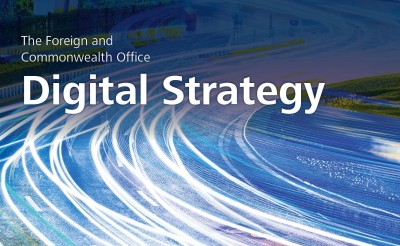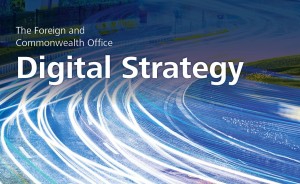20th December 2012 London, UK
The future of digital in the Foreign Office

Today we’ve published the Foreign Office Digital Strategy.
The process of writing that strategy has been an intense one. We organised workshops with policy and service delivery staff, held teleconferences with Embassies around the world, drew on previous internal work and invited comments through an internal forum and external blog. We also drew on expert support and guidance from the UK’s Government Digital Service.
 Part of this work involved breaking down the core areas of a diplomat’s job (looking at the “naked diplomat” as Ambassador Tom Fletcher likes to call it). In each area of diplomatic work – following and predicting developments, formulating and implementing policy, influencing and identifying who to influence, communicating our policy – we looked at how digital tools had already improved foreign policy outcomes and at the potential to take that much further. We looked at the opportunity to use digital to further improve the consular information and services we provide to British nationals around the world – moving to a world where a smartphone can unlock many more of our services. The story that came out for us was of a Foreign Office that has made strong use of digital tools, particularly in our communications, but that has a significant opportunity to use digital more broadly in policy development and in service delivery.
Part of this work involved breaking down the core areas of a diplomat’s job (looking at the “naked diplomat” as Ambassador Tom Fletcher likes to call it). In each area of diplomatic work – following and predicting developments, formulating and implementing policy, influencing and identifying who to influence, communicating our policy – we looked at how digital tools had already improved foreign policy outcomes and at the potential to take that much further. We looked at the opportunity to use digital to further improve the consular information and services we provide to British nationals around the world – moving to a world where a smartphone can unlock many more of our services. The story that came out for us was of a Foreign Office that has made strong use of digital tools, particularly in our communications, but that has a significant opportunity to use digital more broadly in policy development and in service delivery.
The strategy therefore sets a clear vision for how we will use digital in the future. First, making use of digital tools in every element of foreign policy work, including to deliver more open policy formulation and increased transparency. Second, moving to provide our services digitally by default, to deliver more effective services and release resource to dedicate to those British nationals most in need. In sum, this is about spreading the use of digital tools – where they can add value – much more comprehensively through our core work, not replacing but enhancing the application of traditional diplomatic skills.
Implementing this strategy in full will require sustained effort, similar to the changes other industries have gone through in recent years. The strategy contains an implementation plan around ensuring continued leadership, building up digital capability, and tackling other obstacles to making full use of digital. The introduction of a Board level champion, the establishment of a digital transformation unit, the production of new guidance and training relevant to policy and service delivery staff, the increased staff access to social media, and the publication of more encouraging social media guidance are just some of the actions it contains to deliver on this ambitious agenda.
Two last thoughts. First, a thank you to all those – both inside and outside the Foreign Office – who helped in working up this strategy, including those like senior diplomat John Duncan and the Consular team who produced previous digital reviews. Many people generously gave time and wisdom and have improved our efforts as a result. Second, while this strategy will need to evolve and change over time, the overriding ambition of using digital tools to improve how we deliver UK foreign policy will remain a constant. We are also determined to remain among the leading foreign ministries in the use of digital to enhance foreign policy.
Do let me know your thoughts about the Digital Strategy, and on where we should focus as we move to implementation.
Exciting times. As somebody that was involved in digital democracy some moons ago, I think that extended reach is potentially one of the most potent uses of digital for HMG.
Actually, I’d love to know more about the innovation fund as I’ve got some ideas about crowdsourcing policy ideas from british holidaymakers 😉
Shame the new jobs are so London centric…I’d fall over my feet for an opportunity like that.
Great to hear about the accelerating interest in the FCO’s digital future that culminated in the new strategy. Speaking with my UKTI hat on, we’ve done a lot over the last 12 months in Warsaw to ramp up activity online and have seen a corresponding rise in the number of companies accessing our services. The audience is out there.
I have two observations.
One, that the material has to be user generated (and trust should be given to all FCO users to have that power, which is why the news that we’ll be able to use social media platforms on Firecrest is so welcome).
Two, that digital outcomes need to be measurable. In UKTI we’re in the more fortunate business of being able to quantify our outcomes – number of new referrals, responses to tenders etc. but I think the general principle stands. I’d question the effort we dedicate on some platforms – YouTube for example.
It is a good idea. The most important area is ‘communication’.